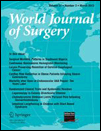Laparoscopic Versus Open Surgery for Stage I Rectal Cancer: Long-term Oncologic Outcomes
Abstract
Background
Laparoscopic resection is increasingly being performed for rectal cancer. However, few data are available to compare long-term outcomes after open versus laparoscopic surgery for early-stage rectal cancer.
Methods
Included in this retrospective study were 160 patients who underwent surgery for stage I rectal cancer between 2001 and 2008. Perioperative outcomes, overall survival (OS), and disease-free survival (DFS) were compared for open versus laparoscopic surgery.
Results
Altogether, 85 patients were treated using open surgery and 80 with laparoscopic surgery. Postoperative mortality (0 vs. 1.3 %; p = 1.00), morbidity (31.3 vs. 25.0 %; p = 0.38), and harvested lymph nodes (22.5 vs. 20.0; p = 0.84) were similar for the two groups. However, operating time was longer (183.8 vs. 221.0 min; p = 0.008), volume of intraoperative bleeding was less (200.0 vs. 150.0 ml; p = 0.03), time to first bowel movement was shorter (3.54 vs. 2.44 days; p < 0.001), rate of superficial surgical-site infection was lower (7.5 vs. 0 %; p = 0.03), and postoperative hospital stay was shorter (11.0 vs. 8.0 days; p < 0.001) in the laparoscopy group than in the open surgery group. At 5 years, there was no difference in OS (98.6 vs. 97.1 %; p = 0.41) or DFS (98.2 vs. 96.4 %; p = 0.30) between the open and laparoscopy groups.
Conclusions
Long-term outcomes of laparoscopic surgery for stage I rectal cancer were comparable to those of open surgery. Laparoscopic surgery, however, produced more favourable short-term outcomes than open surgery.




